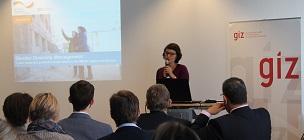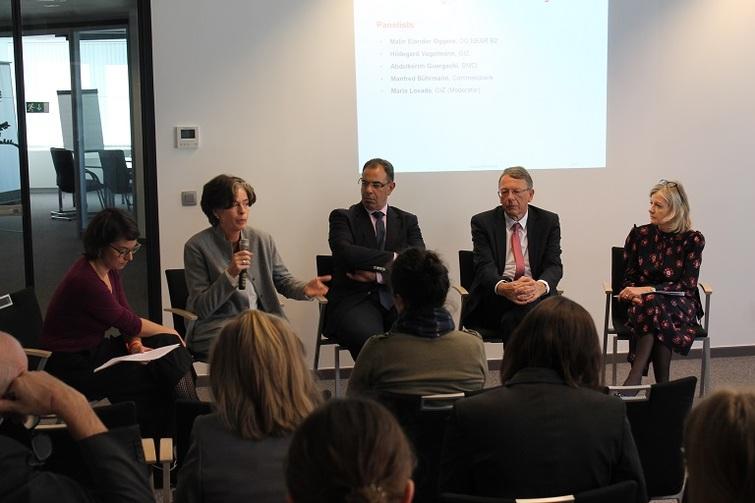Public-Private Partnerships for Employment in the MENA region
The latest Capacity4Change (C4C) event focused on partnerships with the private sector to promote employment - especially for women - in the MENA region. GIZ and the event partners provided insights and examples of their initiatives.

Female participation in companies worldwide holds massive economic potential. A good example of this is the MENA region, where the potential of equal participation in the region’s economy is estimated to contribute around 47 per cent of the region’s annual GDP. In general, smart economics is key: The wording refers to women’s participation in the economy as being essential for sustainable development and economic growth.
To discuss success factors, challenges and lessons learned, GIZ and partners invited to a Capacity4Change (C4C) event on “Partnerships for Employment: Private Sector for Gender Diversity. Examples from the MENA Region” which took place at GIZ´s Brussels Representation on November 8th 2018. GIZ experts from the project “Promoting Employment of Young Women through Gender Diversity Management in Companies in the MENA Region (EconoWin)”, together with the Moroccan Bank for Commerce and Industry (BMCI) and the German Commerzbank shared their experiences.
Overcoming the glass ceiling
To kick off the round of insights, Maria Losada, GIZ coordinator of EconoWin, appealed to the importance of the topic. She mentioned that equal participation is often still impeded by the pertaining glass ceiling. To overcome this hurdle, EconoWin supports on behalf of the German Federal Ministry of Economic Cooperation and Development (BMZ) 24 companies in varying economic sectors in their gender diversity management and therewith employment of women.
Abdelkerim Guergachi, the Director for Strategy, Quality and CSR of the BMCI Groupe BNP Paribas in Morocco, then mentioned several strategies the BMCI Groupe applies: special training, transparent communication, the presentation of good examples, as well as the contact retention with employees on maternity leave. Alongside these steps of action, three key goals were identified to be essential for gender diversity – individual career growth, higher numbers of women in management posts, and the consequent management of gender diversity in companies. Furthermore, respective issues that are still present are constituted by, for example, lacking mutual support by female colleagues, too little female applications for high-level positions and not sufficient initiatives on the side of the companies.
Manfred Bührmann, the Director of the Group Human Resources, Products & Strategy, Diversity at Commerzbank, furthermore posed the question whether today’s concepts of gender diversity in the private sector will still hold in the future and suggested mutual knowledge sharing between the European Union and the MENA countries.
Support for Women in Business
Malin Elander Oggero, Programme Manager for EU Policies at the European Commission`s Directorate General Neighourhood and Enlargement Negotiations, Directorate B – Neighbourhood South gave insights from a policy maker’s perspective. As regards gender diversity management, the EU seeks to be perceived less as donor, but much more as investor and supporter of gender diversity in the private sector. The involvement mainly consists of existing EU-led initiatives for blending and financial inclusion, as well as financial investments in equity and credit funds. Along these initiatives, women-led small and medium-size enterprises (SME), especially in the MENA region, profit from better access to affordable financial services and technical assistance, for example the EU’s program “Women in Business”, launched in Morocco in September.
During the event’s panel discussion, the importance of gender diversity in the private sector was further stressed. According to GIZ project manager Hildegard Vogelmann, government led programs are indeed essential as frame for sustainable development in gender diversity. But without the involvement of the private sector, the engine for equal employment tends to be left out. Thereby, gender equality has to be equally seen as business case, bringing together public and business interests. This is crucial, seen that, if women are not integrated in the private sector, not only a large share of clients are lost, but also around 50 per cent of a company’s potential workforce.
Joint public-private efforts for Gender Diversity and Equality
Subsequently, the audience enriched the discussion with various questions, circling for example around the perception of the changes in gender diversity in the MENA region’s private sector on the side of the male workforce. In addition the question was raised whether the private sector, next to its public counterpart, needs to engage more to reach gender equality, since this – and the SDG’s in general – can only be reached on time if multi-stakeholder engagement is given.
The C4C thus provided a lot of food for thought. Generally, in the course of the discussion, it became clear that gender diversity management is a crucial step forward in sustainable international gender equality and that joint efforts of public-private partnerships, involving governments, civil society and companies are crucial for further social and economic development.

About Capacity4Change (C4C)
Capacity4Change is an event series in Brussels organised by the Deutsche Gesellschaft für Internationale Zusammenarbeit (GIZ) GmbH in cooperation with selected partner institutions and organisations. C4C aims to enrich Brussel’s policy debate with practical know-how and implementation experiences. It features innovative approaches, challenging analyses, interesting publications and thought-provoking ideas.